- Home
- Maya Corrigan
Final Fondue (A Five-Ingredient Mystery)
Final Fondue (A Five-Ingredient Mystery) Read online
FINAL FONDUE
Val noticed Grandad’s drooping eyelids. “Why don’t you go to bed? I’ll take out the trash and set up the coffee maker.”
“Okay.” He gave her a peck on the cheek. “Good night.”
Val carried the trash bag through a small enclosed porch and opened the back door. With no moonlight, she could barely see across the yard to the shed where the garbage bin was. She waited for her eyes to adjust to the dark and then started toward the shed, focusing on the uneven ground so that she wouldn’t stumble.
Halfway across the yard, bulging eyes looked up at her. She jumped back, startled, and dropped the trash bag.
Then she laughed. The plastic eyes sat atop the festival’s souvenir crab hat. One of the tourists staying in the house must have dropped the hat in the yard.
Val stooped to pick up the hat and froze.
Two feet away, a woman lay on the ground, a rope around her neck, her eyes open and lifeless as the crab eyes . . .
Books by Maya Corrigan
BY COOK OR BY CROOK
SCAM CHOWDER
FINAL FONDUE
Published by Kensington Publishing Corporation
Final Fondue
Maya Corrigan
KENSINGTON PUBLISHING CORP.
http://www.kensingtonbooks.com
All copyrighted material within is Attributor Protected.
Table of Contents
FINAL FONDUE
Also by
Title Page
Dedication
Chapter 1
Chapter 2
Chapter 3
Chapter 4
Chapter 5
Chapter 6
Chapter 7
Chapter 8
Chapter 9
Chapter 10
Chapter 11
Chapter 12
Chapter 13
Chapter 14
Chapter 15
Chapter 16
Chapter 17
Chapter 18
Chapter 19
Chapter 20
Chapter 21
Chapter 22
Chapter 23
Chapter 24
Acknowledgments
The Codger Cook’s Recipes
Copyright Page
To Nora, Paul, Kate, Kai, and Oscar with all my love
“Fondue is a conjurer of the past.”
—David Sax
The Tastemakers: Why We’re Crazy for Cupcakes but Fed Up with Fondue
Chapter 1
Val Deniston stood aghast at her bedroom door as her grandfather carried out an armload of her clothes on hangers. “What are you doing?”
“Emptying your closet.” He looked frazzled, with tufts of his white hair sticking out like wings above his ears. “You gotta move all your stuff. And don’t complain, because putting up tourists for the weekend was your idea.”
True, she’d urged him to rent his unused rooms during Bayport’s Tricentennial Festival, but he’d gone overboard. “Pile the clothes on my bed. I’ll deal with them. Last I heard, you had people staying in the spare bedrooms, not my room.”
Granddad reversed course and laid her clothes on the bed. “Jennifer Brown, the woman who reserved three rooms, called back and said she’d cancel them if I didn’t have another bedroom to rent. I couldn’t let her cancel, not after I went to all the trouble of fixing up those rooms.”
All the trouble for him amounted to rooting around the attic for some framed Hitchcock posters, leftovers from his defunct video store, and hanging a poster outside each bedroom. Val had scrubbed the bathrooms, made up the beds, and even added decorative touches to match his posters. Seagull decals in the Birds room. Baskets made of coiled clothesline in the Rope room. Photos of Mount Rushmore and of cornfields in the North by Northwest bedroom.
Val moved jackets and skirts from the closet to the bed. “What poster are you going to hang outside this room?”
“Rear Window. Don’t bother putting any gewgaws in here. You have a window facing the backyard. That’s good enough.” He pointed to the black suit atop the pile of clothing on her bed. “You might as well get rid of those New York clothes. You don’t need them around here.”
He was right. She should donate the suit. She’d worn it often as a cookbook publicist in New York, but never in the eight months since she’d moved into Granddad’s house on Maryland’s Eastern Shore. Now that she was running a café at an athletic club, she could get by with casual clothing. “Where do you want me to put my clothes?”
“The stuff from your dresser can go into the big suitcase in the storage room. Take the clothes on hangers to the closet in my bedroom. Plenty of room there now, though it was full when your grandmother was alive.” He turned to look out the window. “She’s been gone six years.”
Val joined him at the window. “I still miss her too.”
He squeezed her hand gently. “I know.”
She went back to the closet and unhooked the dresses hanging there. “Now the only question is where I go for the weekend.”
“I arranged for you to stay with Monique.”
Startled, Val nearly dropped the dresses. Why had he suddenly reached out to her cousin? He’d been nursing a rift with Monique’s branch of the family for decades, long after everyone else involved in it was dead. “With the traffic this weekend, I don’t want to drive back and forth to Monique’s house. I’d rather stay with someone in town and walk to the festival.”
“I can guess who that someone is.” Granddad crossed his arms. “Gunnar Swensen.”
Ah. Granddad had chosen Monique as the lesser of two evils, but he’d guessed wrong. Though Val had no problem spending a lot of time with Gunnar or even sharing his bed, she wouldn’t stay overnight at his place. Too soon to take that step with him, but high time her grandfather stopped treating her like a teenager. “I’m thirty-two years old, Granddad. I’ll sleep where I want.”
“Monique dropped this off.” Granddad pulled a key from his pocket and gave it to Val. “You’ll hurt her feelings if you don’t stay with her. There are ways around the traffic. It’s a straight shot to town by water from her house. That husband of hers can ferry you.”
Val would hate to depend on Maverick Mott for transportation . . . or anything else. “His boatyard is a stop on the Chesapeake Bay History Tour this weekend. He’ll be busy demonstrating how to build and restore wood boats.” She was resigned to staying with her cousin. “I’ll avoid the traffic by driving to Monique’s house late and leaving early.”
“If you don’t need my help here, I’ll go down and fix a welcome snack for our guests. They’re supposed to arrive around four. That gives me half an hour.” He walked toward the door. “With all this festival to-do, I haven’t had the time to get on the computer and read this week’s lecture. I hate to fall behind in my homework.”
“Please don’t fall behind.” She looked forward to the end of his online course in private investigation. Until he finished it, he’d keep hogging her laptop. His sleuthing a few months ago had given him delusions of becoming a private eye. Why not? After standing over a hot stove once or twice, he’d passed himself off as a food guru, the Codger Cook. He’d used her recipes to snag a job as the local newspaper’s recipe columnist. At least this time he was making an effort to learn the basics before claiming to be an expert. “Be glad the money you collect from renting the rooms for three days will cover your tuition.”
“That’s the only reason I agreed to this.”
If hosting tourists proved painless for him this weekend, Val would try to persuade him to rent the spare rooms through Airbnb or another accommodation service. The house would then produc
e the income needed for its repair and spruce-up. “Maybe you’ll enjoy the company.”
He put on his bah-humbug face. “I don’t need company. I want them to stay upstairs and not get in my way. I moved the small TV from my bedroom to the alcove off the hall up here. With the window seat and the rocking chair there, they should have plenty of room to sit.”
For the first time, Val regretted urging him to open his house to strangers. They would take over the nook where she’d spent countless hours reading. As a child visiting her grandparents, she’d also eavesdropped from that spot, whenever voices drifted up the front staircase. “With the TV there, you’ll hear the audio downstairs.”
“Not if I take out my hearing aids or turn up the TV in the sitting room. I’ll be glad when this festival’s over.” He went down the back stairs, the maid’s route to the kitchen when the Victorian house was built in the nineteenth century.
Val would be glad to have the weekend behind her too. When she volunteered for the Tricentennial Festival committee, she hadn’t realized it would eat up all her free time. Except for the usual six hours a day she spent running the Cool Down Café at the racket and fitness club, she’d done nothing but festival preparations for the last few weeks. Besides coordinating the food vendors and producing a pamphlet describing the town’s restaurants, she’d also prepared as much food as she could ahead of time for her festival booth promoting the café. She looked forward to next week, when she could go back to playing tennis with her friends and testing recipes for her cookbook.
After clearing out her bedroom, Val packed a small bag for the weekend and put it in her car. She’d just hung up the last of her clothes in Granddad’s closet when the hall phone rang.
She answered it and heard a voice from the past. Her brusque former boss raced through the hello-how-are-yous and then said, “I’m calling to offer you your job back.”
For a moment Val was too stunned to speak. A few months ago, she’d have jumped at a chance to go back to the job she once enjoyed. She wouldn’t jump now. Yet she felt a flutter of interest, and she couldn’t suppress her curiosity. “Has something changed in the department?”
“We’re not bringing out any more cookbooks by Chef Henri La Farge.”
So the man responsible for her removal as a cookbook publicist was out. But the department head who’d kowtowed to him was still there. “Thank you, but I—”
“We’ll give you a fifteen percent increase over your previous salary. Take the weekend to think about it. Call me Monday . . . no, Monday’s Columbus Day. Let’s talk Tuesday, okay?”
He hung up without waiting for a reply. He hadn’t changed.
Val cradled the phone in her hand. She’d decided a few months ago that she belonged here in Bayport, close to Granddad and her cousin. So why would her old job even tempt her? Unfinished business, that’s why. She’d pitched her tent here with new ropes and guys, but the old, frayed cords still flapped against the canvas, reminding her of her destroyed career and the colleagues she’d left so abruptly. Should those cords be mended or cut? She’d left friends behind, but made new ones here. She’d also left her cheating fiancé in New York. Now she spent time with Gunnar. After quitting his government job, he could have set up his own accounting practice anywhere. He chose Bayport because she lived here. How would he feel if she left?
She put the phone down and rubbed her temples. Having made a decision, she should stick with it, but she was always second-guessing herself. Her part in solving two recent murders in Bayport had given her ample reason to distrust her first instincts.
Granddad peered into the hall from the sitting room. “I hope that wasn’t our guests canceling or demanding another bedroom.”
Val couldn’t resist a tit for tat. “They needed another room, so I okayed it. I figured you could move out.” She pointed to his bedroom at the end of the downstairs hall. “You want some help packing?”
Granddad’s eyes turned as round as his wire-rimmed bifocals. “What’s the matter with you, Val? Call ’em back and tell ’em no dice. I’m not going to leave my own house.”
She grinned. “Just kidding. What snacks are you putting out for our guests?”
“Come to the kitchen and see.” He pivoted and crossed the sitting room toward the back of the house.
She followed him, expecting to find chips and dip on the counter. Instead, a sectioned platter held strawberries, banana chunks, and wedges of kiwi fruit. Cubes of angel food cake were in a bowl, and a ceramic pot rested on a stand with a tea light under it.
“That’s impressive, Granddad.” She managed to keep the surprise out of her voice. “Where did you get that fondue pot?”
“Found it in the attic. Back in the sixties and seventies, we used to have neighborhood fondue parties. Cheese fondue at one house, beef fondue at another, and then chocolate fondue somewhere else.” He picked up a dog-eared index card from the counter. “Here’s your grandmother’s favorite chocolate fondue recipe. I’ll try it out on our guests. If they go for it, I’ll enter it in the dessert cook-off on Sunday. It’s less work than making cookies.”
“You can’t go wrong with chocolate.” Val picked up one of the fondue forks on the counter. Set into its five-inch-long wood handle was a metal piece of equal length, the last two inches of which forked into pointed tines. “These elongated tines are for spearing meat. The forks for cheese and chocolate fondue don’t need to be so long and sharp.”
“I only found two of those. We have seven of these.” The doorbell rang. “That’s probably one of our guests.” Granddad donned a khaki apron with CODGER COOK printed in red letters on it.
Most people took off an apron when company came, but not Granddad. He didn’t mind spilling food on his old clothes, but he kept the Codger Cook regalia spotless to promote his “brand.” He lived in hope that someone would snap a picture of him in the apron, post it online, and bring him instant fame.
“You take care of the snack, Granddad. I’ll meet the guests at the door.”
“And collect the money for the rooms. I said payment was due upfront. They’ll probably want to pay by credit card, and I’m not sure how to use that gizmo you have for your phone to swipe the cards.”
Val hurried to the front door. A petite woman stood on the porch, dressed for the mild autumn afternoon in rolled-up jeans and a rust-colored corduroy shirt. Despite clogs that added to her height, she stood no taller than Val’s five foot three. She looked under thirty, but not by much.
She smiled, revealing dimples in her plump cheeks. “Hello. How are you? I’m Fawn Finchley. If this is Mr. Myer’s house, I’m supposed to stay here this weekend.”
“I’m Mr. Myer’s granddaughter, Val Deniston. Please come in.”
Fawn put her overnight bag on the floor in the hall. “This is such a cool house with the round tower and the gables. Is it as old as it looks?”
Val suppressed a smile. “It’s 125 years old. Some of the buildings in Bayport’s historic district go back to the early eighteenth century, when the town was founded. Would you please sign the guest book?” Val pointed to an open book on the table by the staircase. She caught a whiff of cigarette smoke. The house rules she’d printed and left in each bedroom specified no smoking. Fawn was probably used to smoking outside. If she did it indoors at home, her clothes would have given off more than a whiff.
Fawn took her time signing. “No one else has signed in yet. I must be the first one here.”
“Right. I can run your credit card for the three nights you’ll be staying.”
Fawn’s forehead wrinkled. “Didn’t Jennifer take care of that? She made the reservations.”
“She didn’t pay yet. Don’t worry about it. We’ll deal with it when she gets here.”
Granddad appeared in the archway between the sitting room and the hall, looking like a beardless Santa with furry white eyebrows and bifocals slipping down his nose. His Codger Cook apron over a plaid shirt and navy trousers substituted for Santa’s red sui
t. “Come in and make yourself at home.” He motioned them toward the sitting room.
Val introduced him to his first guest.
Fawn gave him a high-wattage smile. “Thank you so much for opening your beautiful house to us, Mr. Myer. The woodwork in here is gorgeous. Such a homey room with the fireplace and bookshelves, and what pretty dried flowers.”
Val tried to catch Granddad’s eye so she could give him an I-told-you-so look. He’d complained about spending money on the flower arrangements for the coffee table and the fireplace mantle. They were worth every penny. They picked up the yellow and muted orange colors of the throw pillows on the sofa and added cheer to a room with worn furniture.
Fawn asked about the Codger Cook apron, giving Granddad a chance to awe her with his celebrity status as the newspaper’s food columnist. While he preened and Fawn fawned, a second guest knocked on the door.
Val opened it to a thirtyish man with a pallid face and protruding ears. Noah Hurdly had clearly come straight from work, wearing dark trousers, the matching suit jacket folded on his arm and his off-white dress shirt open at the collar. He carried a leather attaché case and a matching overnight bag. Val asked him to sign the guestbook. He took two seconds to scrawl his name and offered her his credit card.
Granddad was showing Fawn his collection of classic movies on the shelves near the fireplace when Noah went into the sitting room and introduced himself.
Fawn’s face lit up like a child’s on Christmas morning. “Noah! The best man, right? I’m a bridesmaid, Fawn Finchley.”
Noah seemed at a loss for words. He cleared his throat. “Oh. The latest bridesmaid.”
His toneless voice gave Val no clue if Fawn had replaced a dropout bridesmaid or had joined a growing line of the bride’s attendants.
If the idea that she wasn’t the first bridesmaid chosen fazed Fawn, she didn’t show it. “I’m so excited to be here this weekend. You’re a lawyer like Jennifer’s fiancé, right?”

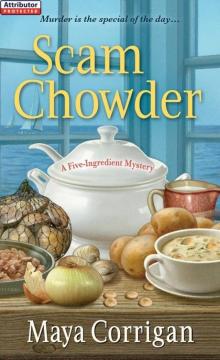 Scam Chowder
Scam Chowder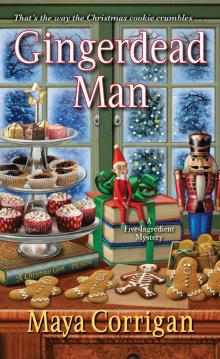 Gingerdead Man
Gingerdead Man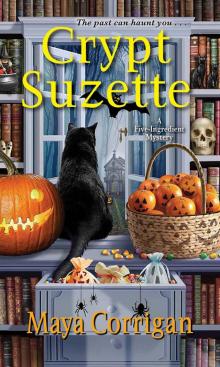 Crypt Suzette
Crypt Suzette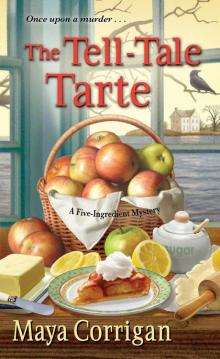 The Tell-Tale Tarte
The Tell-Tale Tarte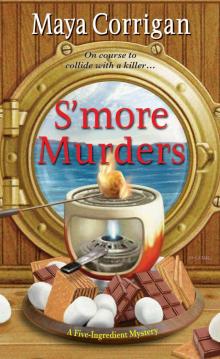 S'more Murders
S'more Murders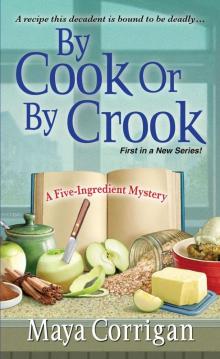 By Cook or by Crook
By Cook or by Crook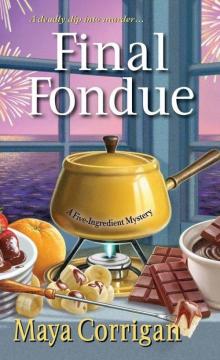 Final Fondue (A Five-Ingredient Mystery)
Final Fondue (A Five-Ingredient Mystery)